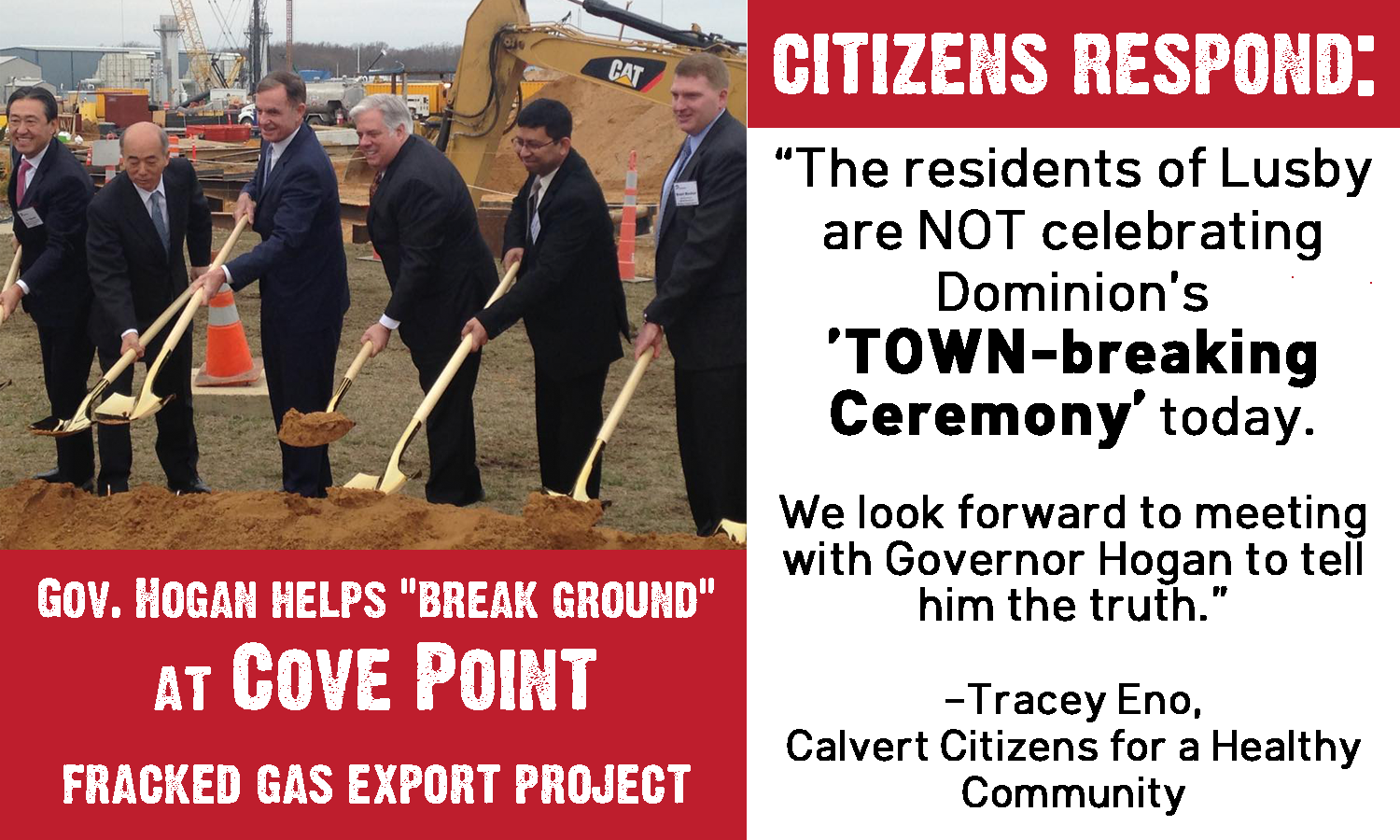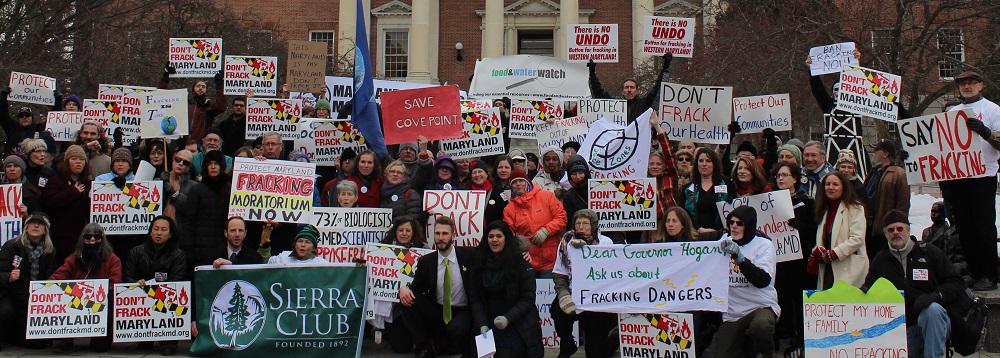Activists bring a 40-foot ‘pipeline’ to the governor’s offices in Richmond to dramatize the risks Dominion is forcing on Virginia communities
RICHMOND—Citizens in the path of Dominion Resources’ proposed Atlantic Coast Pipeline joined with environmental advocates in Richmond today to deliver over 5,000 messages to Governor Terry McAuliffe demanding that he rescind his support for the massive fracked gas project. Activists brought their own 40-foot inflatable “pipeline” prop emblazoned with the words “No New Pipelines!” to the Patrick Henry Building for a noon press conference, and then hand-delivered the petitions.
View photos from the press conference, including the pipeline prop, at: https://www.flickr.com/photos/chesapeakeclimate/sets/72157651811591031/
Speaking ahead of the delivery, landowners called on Gov. McAuliffe to stand with them in defending the safety, natural resources, and economic security of Virginia communities—instead of paving the way for Dominion’s private gain. Environmental advocates stressed further that the proposed pipeline flies in the face of the governor’s commitment to tackling climate change, given studies showing gas extracted through the controversial practice of fracking disrupts the climate on par with coal.
“Our homes, farms and rural lifestyle should not be taken from us against our will to build an ‘energy superhighway’ for Dominion,” said Joanna Salidis, president, Friends of Nelson County. “Our confidence that the regulatory process, or our government itself, will protect the public, has been severely eroded, especially as we see how Dominion controls energy policy in Virginia. The interdependence between our government, at every level, and the fossil fuel industry is seriously compromising our rights to safety, health, and due process.”
Today’s petition delivery follows the March launch of pipeline opponents’ “All Pain, No Gain” advertising and online campaign, which refutes Dominion’s claims about the project’s benefits.
“For the people in western Virginia, this proposed pipeline has no up side,” said Nancy Sorrells, co-chair of the Augusta County Alliance. “Our property rights are ignored, our precious water resources are threatened, our public safety is compromised, our environmental and historic resources ravaged, and our farm and properties devalued. In return we get nothing! Are the precious headwaters of the James and Shenandoah Rivers worth the gamble? For those who depend on clean drinking water in the Shenandoah Valley, Washington, D.C., and Richmond, the answer should be no.”
“Why would our Governor support a project that threatens Virginia residents with eminent domain, property seizures, a decline in property values, known risks to human health and a complete disruption to our quality of life in Buckingham County?,” said Heather Nolen, chair of Friends of Buckingham County, where Dominion has proposed siting a gas compressor station along the pipeline route. “Buckingham citizens continue to operate in a vacuum of information, even as our research shows compressor stations are heavily polluting. The Federal Energy Regulatory Commission has enabled Dominion’s campaign of silence and furthered a process that continues to overlook one of the most impacted communities along the pipeline route. Who will stand up for our interests?”
The Augusta County Alliance, Friends of Nelson and Friends of Buckingham partnered with the Chesapeake Climate Action Network, Sierra Club, Virginia Chapter, and Environmental Action to gather and deliver the petitions.
“Governor McAuliffe can’t be a leader on climate while supporting Dominion’s multi-billion dollar investments in dirty and dangerous fracked gas,” said Lauren Goldman, Virginia Campaign Coordinator at the Chesapeake Climate Action Network. “Largely thanks to Dominion, Virginia ranks near the bottom regionally for energy efficiency and solar power, while having some of the highest average electric bills. Why endanger our farms, homes and natural resources with new gas pipelines when we could see greater economic gains, more stable prices, and less pollution through efficiency measures, solar and wind power?”
“Significant environmental damage would occur as a result of construction of the pipeline in karst topography, over mountainous terrain and through sensitive environmental areas including the George Washington and Monongahela National Forests, the Blue Ridge Parkway and the Appalachian Trail,” said Kirk Bowers, Pipeline Organizer, Virginia Sierra Club. “The Sierra Club is submitting petitions to the Secretariat of Natural Resources expressing our request for consideration of the serious environmental consequences of constructing large diameter pipelines in Virginia.”
“Environmental Action stands with Virginia property owners and concerned citizens from the shipyards of Norfolk to the mountains of Blacksburg,” said Anthony Rogers-Wright, Policy and Organizing Director, Environmental Action. “This is not a liberal or a conservative issue, it’s a case of right and wrong for our people and the planet we all depend on. Dominion primarily wants to maximize its profit, while we in Virginia get stuck with the contaminated drinking water, leaking pipelines, and inevitable damage.”
BACKGROUND:
In September, Governor Terry McAuliffe stood with Dominion CEO Thomas Farrell to endorse the company’s proposal to build a $5 billion, 550-mile, 42-inch high pressure pipeline to carry fracked natural gas from West Virginia, across central Virginia, to North Carolina. The project is one of three proposed pipelines to carry fracked natural gas across the state. While Gov. McAuliffe recently asserted he’s in “constant communication” with Dominion, he has yet to meet directly with Virginians concerned about the potential harm the pipeline and associated compressor stations could cause to local property values, human health, agricultural, cultural and water resources, and public lands that sustain local economies.
Landowners, farmers, business owners, students, environmentalists and other concerned residents have mobilized a strong and growing grassroots resistance to oppose pipeline construction. Concerned residents packed recent scoping meetings held by the Federal Energy Regulatory Commission. To counteract inflated claims about the project’s benefits, Friends of Nelson, the Augusta County Alliance, and Friends of Buckingham have also commissioned an independent impact study of the economic losses that the project could inflict.
CONTACT:
Nancy Sorrells, Augusta County Alliance, 540-292-4170, lotswife@comcast.net
Joanna Salidis, Friends of Nelson, 434-242-5859, josalidis@gmail.com
Monique Sullivan, Chesapeake Climate Action Network, 202-440-4318, monique@chesapeakeclimate.org
###



